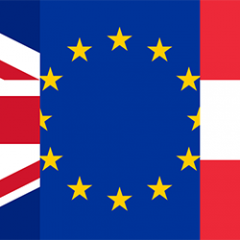I think you will spend 260 seconds reading this post
In recent weeks it has struck me about the necessity of being well prepared for all eventualities. In my case it has now become a case that with added family responsibility I have had to ensure that I am also prepared for both eventualities to also ensure my infant son’s well-being, regardless of the outcome of the referendum on 23 June.
My recent interview with Joe Mayes, a Paris-based journalist, featured as an article on his blog and may eventually also make its way into other media outlets. Some of the other people featured, some studying and others working in Paris, demonstrated how one of the major issues to address is to ensure that those Britons abroad who are eligible to vote can and do. Another issue to come out of the piece was the fact that there are many Britons living in the EU for whom there is a financial dependency on the UK, and for whom a Brexit and exchange rate volatility is likely to affect their continuing existence.
Such issues are of course not new – the fall-out of leaving ERM saw sterling devalue by 20% against the Deutsche Mark and the French Franc. More recently lenders having taken out Swiss Franc-denominated loans have also seen the fall-out from a plummeting exchange rate. But neither of these cases has affected Brits as much as sterling volatility in the event of a Brexit. For many Brits abroad savings and earnings in sterling play an important role – many have not gone “all-in” on their local currency and has served a bit of a “safe haven” role. Others depend on their savings in sterling to supplement their local currency income – this is particularly frequent among those who retired abroad, or those making a new start and in a transitional state in career terms. While I had never imagined leaving Austria, the looming referendum has meant I have had to up my allegiance to my Host nation and any decision for me to return to the UK with my young family, a hypothetical one at best, has been indefinitely dismissed. There are plenty of reasons for this: my wife would struggle to work in the UK – given the vicious circle that I would experience. Initially I would have to support my son and wife, and in light of the wages commanded by the profession I am in, the chances are that I could not sustain a lifestyle that we would want to entertain. In this regard I have had to set a course that sees me assimilate even closer to a completely Austrian lifestyle – and looking into the possibility of citizenship as an ultimate fall-back option.
For the time being, I have focussed on ensuring that nothing is left to chance. In addition to ensuring that I have no dependency on any funds from the UK, I have had to make sure that all the paperwork is in place. Fortunately, I have a permanent employment contract at my employer, and as things stand at the moment have permanent residence in Austria. I am in the process of ensuring similar for my son, although since he was born after 2006, it will be necessary to renew it regularly unless he takes up Austrian citizenship at some point in the future. To set the wheels rolling in my son’s case, it was essential to get his British passport issued. One poster in an expat forum questioned why an infant would need a passport – seemingly unaware that children no longer travel on their parents’ passports. Moreover, my son’s UK passport serves as the only document that confirms his citizenship. While the Magistrat here in Vienna agreed upon registration that he was entitled to British citizenship by descent, his citizenship was only confirmed by holding of a UK passport. A consular birth registration would not suffice for this purpose.
Now it remains important to finalise my son’s residence permit – which in turn hinges on the passport – and which I need to ensure is processed and granted by 23 June to be on the safe side for the duration of a transitional period in the event of a Brexit. Once that is done all the steps are taken to at least ensure that we are in a position to be able to forge ahead with the measures that need to be taken to safeguard our existence, rather than running the risk of being trapped in some kind of no-man’s land in case the situation changes.
It is too early to tell what ramifications there could be for others, but my advice would be, particularly for those whose employment situation is somewhat uncertain, to ensure that you look towards having the necessary language skills to assist your application to work in your Host country, as the language hurdles that have applied to many non-EU nationals could soon apply to you. In any case, if you were to go down the road of naturalisation, your application for citizenship may also depend on whether you are deemed to have the requisite language skills to allow you to work in Austria – B1 or B2 levels are usually required depending on whether you want to naturalise after 6 or 10 years.
